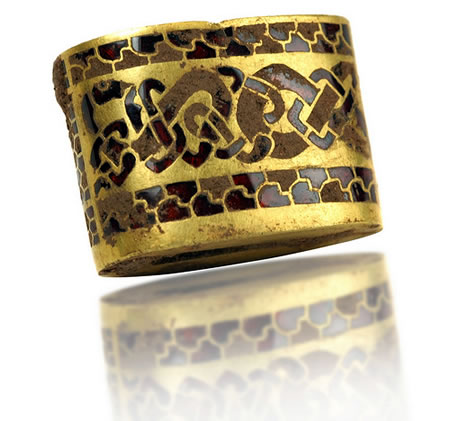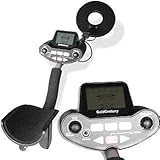Treasure Hunting and Metal Detectors
The Staffordshire Hoard, My Inspiration
The largest ever hoard of anglo-saxon gold and silver was found in a farm field by an amateur metal detectorist. The gold found includes spectacular gem studded pieces. The weapons and helmet decorations, coins and Christian crosses amount to more then 1500 pieces and adds up to 5kg of gold, making it the largest ever anglo saxon gold ever found.
This find has made its finder very rich indeed! And I wish it had been me! This story has set my imagination aflame. The value of this found treasure is only part of the story. The historical importance of this find is quite likely as valuable as the gold itself. Imagine playing such a huge role in a historical discovery that will undoubtedly paint a more accurate picture of ancient life.
Putting my feet back firmly on the ground I have to say that finding treasure is no guarantee. Finding tin cans or other bits of rubbish metal is almost a guarantee. To be realistic with my imaginings I can see finding something of reasonable value and/or historical significance. By doing a little research into areas where valuable items could have been dropped and lost at some point in history (even recent history) can significantly increase the chances of making a good find.

Metal Detectors, Which One To Go For
Unless you have a treasure map where X marks the spot the only tool I can advise for finding potential treasure is the metal detector. If you do happen to have a treasure map where X marks the spot, please feel free to share it with me :D.
Before I began looking for a good metal detector I was aware that this technology has advanced beyond simple metal detecting. Modern metal detectors are able to indicate not just that there is some metal buried in a certain spot, they can analyze the shape and type of metal helping you to avoid digging up a bit of metal trash. I started wondering just how advanced metal detecting technology is, and found there are actually quite a few things to consider.
Choosing A Metal Detector
Things you need to consider when choosing a metal detector include, who is going to use it, what will it be used for and roughly how much you want to spend. Prices for metal detectors can range considerably. People will often buy a base model detector if they are getting one for their children or just to take on a holiday and are not sure how much they will actually use it. If you want more options and better depth with your unit you may need to look at performance models. Performance model metal detectors are very good and are microprocessor controlled, this feature is typical of more expensive models and can be found on mid range models through to upper end models.
Discrimination control on metal detectors allows iron, silver paper and other trash items to be ignored by the detector. The higher the control is set the more objects will be ignored allowing the user to focus on metals such as gold, silver, copper and other metals (not iron or steel).
Non-motion and Motion metal detectors are two options to think about. The head of motion metal detectors must be kept moving 'scanning' the ground in order to detect metal. The moment this motion is stopped the detection stops. The advantage with these detectors is that they allow for more sophisticated metal detecting and are self tuning. Motion metal detectors offer better target analysis and are not affected as much by mineralized ground and usually achieve a greater penetration and clearer discrimination.Non-motion detectors are metal detectors that have an all metal mode without a Self Adjusting Threshold or SAT. In general terms the all metal mode is a non motion mode.
Earlier I mentioned microprocessor control. The microprocessor is a complex electronic circuit that performs all the logic, arithmetic and control functions. Microprocessors in metal detectors opens up a wealth of possibilities without additional control knobs and switches. With this a single metal detector can be set up for just about any application to suit personal preferences. The real advantage to a microprocessor is that you can select your preference from the menu such as coin hunting, prospecting, relic hunting or whatever else you might be hunting for.
The Most Commonly Used Metal Detectors
Most detectorists choose VLF/TR motion discriminator detectors with silent search for a primary machine. These detectors have the ability of controlling trash detection and mineralization of soil simultaneously. Popular innovations include coin depth indication, target identification. Other innovations that should be mentioned are surface mount technology that has opened the doors to miniaturization and extremely compact designs.
I hope this information has been of use to you and happy treasure hunting!












